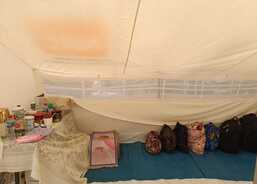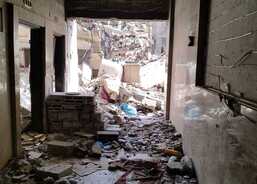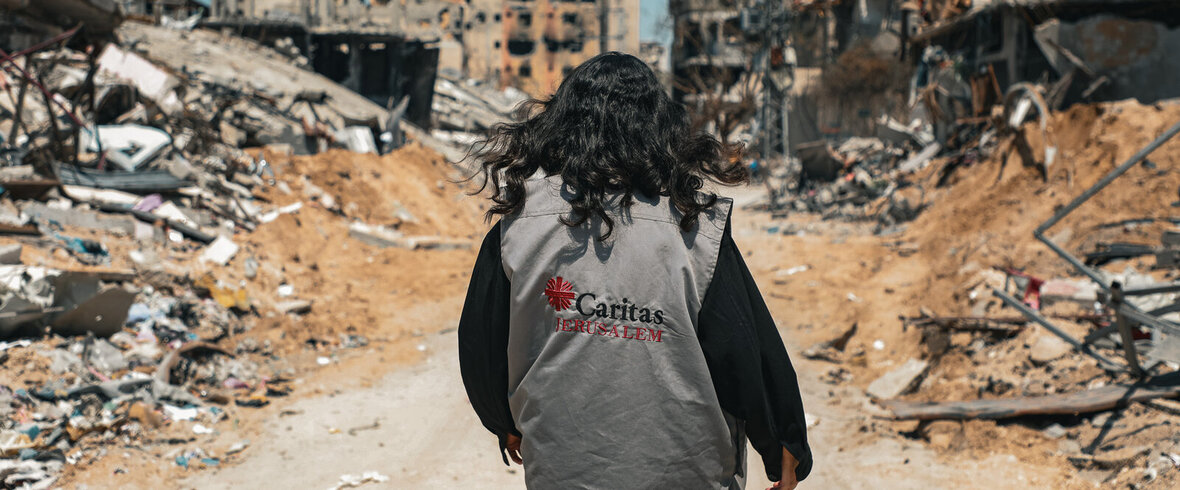Since May, Ola has been coordinating social work in southern Gaza. Despite her own exhaustion and painful losses, she helps every day those who have lost their homes, suffer from hunger, or need psychological support. Under the programme funded by the Ministry of Foreign Affairs of the Czech Republic and fundraiser Caritas for Gaza, Caritas provides basic healthcare, medicine distribution, crisis intervention, and training of local social workers and psychologists. We are among the few organisations with staff on the ground in the Gaza Strip, working to ensure that people there do not lose hope or access to support—a commitment we honour and reflect on the World Humanitarian Day.
"One little girl recently told me that she no longer remembers what food tastes like," Ola recounts. These words capture the harsh reality of thousands of people in Gaza. Hearing them, Ola realises that, even if she has only one meal a day for her children, she is among the luckier ones.
A dream of home interrupted by war
Ola had lived through domestic violence. Yet, she found the strength to begin again. She earned a Master's degree in mental health and has been engaged in humanitarian work for more than 15 years. She has worked in Gaza, Kenya, South Sudan, and refugee camps in Jordan. She married for the second time and gave birth to two sons. After years of effort, she fulfilled another dream: she bought a small flat near the coast of Gaza. She was proud of her home, full of children's laughter and the scent of freshly baked bread.
All of that ended on 9 October 2023. The war began, and she had to flee urgently with her sons and with fresh caesarean scars.
We left behind absolutely everything, including the children’s drawings on the walls and scattered Lego pieces. That moment when I had to leave is etched in my heart and will never fade,
Ola recalls.
Since then, she has had to change her home more than eleven times. She has experienced bombings many times and has lived in makeshift shelters infested with insects and rats. When she could later return home, there was nowhere to return to. Their building was partly destroyed, and the apartment burned. The home was gone.
One pot of food for the whole day
Today, she lives with her family in a half-ruined apartment. Every morning, she lights a fire to cook lentils, rice, or pasta—these are the only available ingredients. Two loaves of bread must be divided among four people. She has no clean water, diapers, medicines, or hygiene supplies. "My younger son cries every morning because he wants his milk," says Ola, tiredly. In front of the child, and sometimes even to herself, she pretends that everything is fine.
In addition to her two sons, Ola also cares for her five-year-old niece, whose mother and brother recently died during bombings. The little girl, confused and terrified by the loss, recently confided in her: "Take me to Mama… I miss her." That sentence sends chills. Rather than playing with dolls, the little girl yearns for her mother. Her innocent words are a painful testament to how deep the wounds of war are in children’s hearts.
Helping others despite her own pain
Day after day, through her work with Caritas, Ola meets families who have not eaten for days, and children whose childhoods have shrunk to hunger and fear. Her son repeatedly draws houses—it is his way of coping with the loss of home. He plays with mud and pretends to cook food. "We laugh and pretend to buy food from him," Ola says, "but then he stops and asks: ‘Mummy, why are they doing this to us? What did I do wrong?’ " Ola cannot answer those questions.
For Ola, humanitarian work is more than a profession. It is a calling—a way to protect her children, her community, and her humanity in the face of unimaginable loss.
Every year, on 19 August, we mark World Humanitarian Day, a moment to reflect on the dedication of humanitarian workers. It was proclaimed in 2008 by the United Nations in memory of the lethal attack on the UN mission in Baghdad on 19 August 2003, which killed 22 humanitarian workers.
Who is a humanitarian worker?
A humanitarian worker is someone who helps people affected by crises—whether war, natural disaster, or other emergencies. Humanitarian workers assist in many ways—from field assistance to psychological support or crisis intervention. They also manage logistics and administration at the crisis site—and when the immediate emergency subsides, humanitarian aid often evolves into long-term support. These are professionals with many years of experience, often from the affected area or country itself.
In 2024 alone, internationally, more than 380 humanitarian workers were killed across 20 countries—the deadliest year on record. And the trend is not improving: in the first five months of 2025, already 128 workers were killed in 17 countries. Caritas Czech Republic, together with other organisations, advocates for compliance with international humanitarian law and for ensuring the protection and support of humanitarian workers. It is they who, in times of crisis, risk their own lives to save others and deliver aid where it is most needed.











